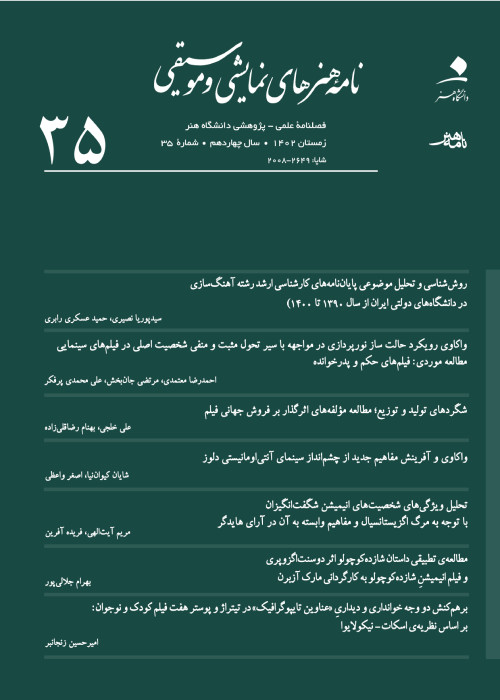Reverse Clown: A Case study of Davud-e Gil in the play The Magnificent Smile of Mr.Gil"
Author(s):
Abstract:
Every character type may change as time goes by, based on the social conditions which make him different and sometimes opposite of what it used to be. The clown of the Iranian traditional plays –Siyâh- in Siâh Bâzi and Mobârak in Kheyme Shab Bâzi (The Iranian marionette play)- have been funny and instructive. Different types of their characteristics can be sorted out in 4 groups: Physical characteristics, moral and behavioral characteristics, confrontation with the holders of the upper hands, and finally and making others aware and conscious. But this character type has undergone some general changes as an Iranian dramatic element, to the extent that its study requires a sample pattern. This pattern can demonstrate the course in which this character type has been changed. The changing ‘Ayyâr Character group to Luti and after that to Lumpin can be regarded as an appropriate pattern for the study of this changing character, which is influenced by the social conditions. In this changing course a character with good function and traits who is helper for people (‘Ayyâr) make to a character with negative functions and traits in society (Lumpin). According to this sample course a kind of changed clown is designed and introduced which shares some characteristics and functions of the traditional clown, but in a revere direction. Therefore he is referred to as a “reverse clown” in this article. In This changed clown frankness converts to giving orders, rebelliousness converts to rudeness, and mockery converts to insult and contempt. In the study of the tradition clown, we notice a confrontation between the clown as slave and a representative of the lower class with the master as a representative of the higher class. However, with respect to the reverse clown, this confrontation sometimes changes, and the master humiliates the lower class people. This changed kind can be noticed in the play The magnificent smile of Mr. Gil by Akbar Radi, in which Davud Gil is introduced as a reverse Clown. He has clownish characteristics in an inverted direction, like giving ridiculous names to others but he is distinctively a reverse clown against Tuti, the house maid, who belongs to the lower class of the society. Davud is a hunter and gambler who considers Tuti as his property, and believes that he can sacrifice her for the good health of his father Mr. Gil. Just like the court ester who makes the king happy and entertained, Davud as a reverse clown offers Tuti for Mr. Gil’s satisfaction; an action which leads to her destruction. As a reverse clown, Davud has two character sides. He is a happy clown on one hand, who mocks everybody, and on the other hand, he is a hopeless and self-destructive person. After his father’s death, he shows his brutal character against Tuti, and leads her to her suicide. This self-destruction also shows his inverted trait in comparison with the clown in traditional theatre, who wakens the conscious of the society, and is therefore an effective and useful character. Generally, the characteristics and functions of this reverse clown in comparison with the traditional clown can be classified in 8 cases: ridiculous naming, giving orders like the master, humiliating sarcasms, rudeness, buffoonish, self- admiration, making happy with scarifying the other and self-destruction.
Keywords:
Language:
Persian
Published:
Journal of dramatic Arts and Music, Volume:4 Issue: 7, 2014
Pages:
5 to 13
magiran.com/p1299422
دانلود و مطالعه متن این مقاله با یکی از روشهای زیر امکان پذیر است:
اشتراک شخصی
با عضویت و پرداخت آنلاین حق اشتراک یکساله به مبلغ 1,390,000ريال میتوانید 70 عنوان مطلب دانلود کنید!
اشتراک سازمانی
به کتابخانه دانشگاه یا محل کار خود پیشنهاد کنید تا اشتراک سازمانی این پایگاه را برای دسترسی نامحدود همه کاربران به متن مطالب تهیه نمایند!
توجه!
- حق عضویت دریافتی صرف حمایت از نشریات عضو و نگهداری، تکمیل و توسعه مگیران میشود.
- پرداخت حق اشتراک و دانلود مقالات اجازه بازنشر آن در سایر رسانههای چاپی و دیجیتال را به کاربر نمیدهد.
دسترسی سراسری کاربران دانشگاه پیام نور!
اعضای هیئت علمی و دانشجویان دانشگاه پیام نور در سراسر کشور، در صورت ثبت نام با ایمیل دانشگاهی، تا پایان فروردین ماه 1403 به مقالات سایت دسترسی خواهند داشت!
In order to view content subscription is required
Personal subscription
Subscribe magiran.com for 70 € euros via PayPal and download 70 articles during a year.
Organization subscription
Please contact us to subscribe your university or library for unlimited access!



